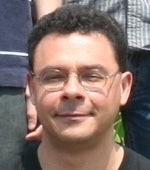
Luis Ibáñez works as Senior Software Engineer at Google Inc in Chicago. Opinions expressed in this site are his own.You can find him in github at: http://www.github.com/luisibanezand in twitter at: http://www.twitter.com/luisibanezHe previously worked as a Technical Leader at Kitware Inc., and Director of Open Source Community Development at the Open Source EHR Agent (OSEHRA). At Kitware he was closely involved in the development of open source software for medical imaging applications, in particular, working with the Insight Toolkit (ITK).Luis is a strong supporter of Open Access, and one of the editors of the Insight Journal, an OA Journal that enforces the verification of reproducibility. In collaboration with other instructors, Luis taught a course on Open Source Software Practices at RPI between 2007 and 2013, and also at the State University of New York at Albany between 2011 and 2014.Luis Ibáñez received a B.S. in Physics from the Universidad Industrial de Santander (Bucaramanga, Colombia) in 1989 and a M.S. in Optics from the same university in 1994. He received a D.E.A and Ph.D. degrees from the Universite de Rennes I (Rennes, France) in 1995 and 2000, respectively. In 1999, Luis Ibáñez joined the Division of Neurosurgery of the University of North Carolina at Chapel Hill and participated as a member of the MIDAG and CADDLab groups. His work at UNC was related to the development of algorithms for 2 and 3D registration applied to image guided surgery. He also participated as developer of the INSIGHT Registration and Segmentation Toolkit sponsored by the National Library of Medicine. Luis Ibáñez joined Kitware, Inc. in February 2002 where he was one of the main developers of the Insight Toolkit (ITK) coordinating its maintenance with other developers and the user community; he is also one of the main developers of the Image Guided Surgery Toolkit (IGSTK) and participated in crafting the operational principles of the Insight Journal. Luis Ibáñez is a strong supporter of Open Access, and the verification of reproducibility in scientific publications and is a regular speaker in ITK training courses, and in events disseminating the principles of Open Source. In August 2014, Luis joined Google Inc as Software Engineer, to work with the corporate engineering team in New York city.

Authored Comments
Stacy,
I appreciate your point of the importance of building personal connections between the experienced "pros" and the newbies, so that the experience can be pass it on. Fully agree with you in that online communications are insufficient, and that documentation (although useful) can't serve as replacement for that face-to-face interaction.
I have found that bringing people from industry, as invited speakers to classes, helps a bit to create such connections. It is certainly not sufficient, but it is a starting point. Experienced professionals always appreciate the opportunity to talk to younger people and share what they know, while at the same time students enjoy hearing about the "real world" from speakers other than their professors.
Such connections could be extended through HackerSpaces, which I think is something that every University should have, and where local experienced professionals should be involved. This type of informal and unstructured education is a very effective way of "passing on" experience to younger generations.
Stacy,
Thanks for the insightful comments.
I fully agree with you, particularly on the importance of having some understanding of hardware, when it comes to being able to write drivers and low level APIs.
The current popularity of the Raspberry Pi, and similar inexpensive boards (such as the Beagle Bone), provide a promising venue for educating this new generation of engineers who are literate in the continuous range of topics from electronics, controllers, low level interfaces, drivers, and operating systems.
Some Universities see the value on these programs. For example here is the adoption of Raspberry Pis in replacement of textbooks at SUNY Albany:
https://opensource.com/education/13/10/raspberry-pi-trade-textbook
Your point is well taken, that many University programs are rather interested in the shiny mobile apps that make for great demos because they are highly visual and accessible.